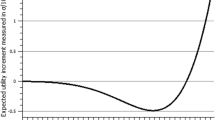Abstract
We study a model in which a group of agents make a sequence of collective decisions on whether to remain in the current state of the system or switch to an alternative state, as proposed by one of them. Examples for instantiations of this model include the step-wise refinement of a bill of law by means of amendments to be voted on, as well as resource allocation problems, where agents successively alter the current allocation by means of a sequence of deals. We specifically focus on cases where the majority rule is used to make each of the collective decisions, as well as variations of the majority rule where different quotas need to be met to get a proposal accepted. In addition, we allow for cases in which the same proposal may be made more than once. As this can lead to infinite sequences, we investigate the effects of introducing a deadline bounding the number of proposals that can be made. We use both analytical and experimental means to characterise situations in which we can expect to see a convergence effect, in the sense that the expected payoff of each agent will become independent from the initial state of the system, as long as the deadline is chosen large enough.
Preview
Unable to display preview. Download preview PDF.
Similar content being viewed by others
References
Rosenschein, J.S., Zlotkin, G.: Rules of Encounter. MIT Press, Cambridge (1994)
Endriss, U., Maudet, N., Sadri, F., Toni, F.: Negotiating socially optimal allocations of resources. Journal of Artif. Intell. Res. 25, 315–348 (2006)
Lang, J., Xia, L.: Sequential composition of voting rules in multi-issue domains. Mathematical Social Sciences 57(3), 304–324 (2009)
May, K.O.: A set of independent necessary and sufficient conditions for simple majority decisions. Econometrica 20, 680–684 (1952)
Sen, A.K.: Collective Choice and Social Welfare. Holden-Day (1970)
Grinstead, C.M., Snell, J.L.: Introduction to Probability, 2nd edn. American Mathematical Society (1997)
Laslier, J.F.: Tournament Solutions and Majority Voting. Springer, Heidelberg (1997)
Baron, D.P.: A dynamic theory of collective goods programs. The American Politicial Science Review 90, 316–330 (1996)
Penn, E.M.: A model of farsighted voting. American Journal of Political Science 53, 36–54 (2009)
Author information
Authors and Affiliations
Editor information
Editors and Affiliations
Rights and permissions
Copyright information
© 2009 Springer-Verlag Berlin Heidelberg
About this paper
Cite this paper
Airiau, S., Endriss, U. (2009). Iterated Majority Voting. In: Rossi, F., Tsoukias, A. (eds) Algorithmic Decision Theory. ADT 2009. Lecture Notes in Computer Science(), vol 5783. Springer, Berlin, Heidelberg. https://doi.org/10.1007/978-3-642-04428-1_4
Download citation
DOI: https://doi.org/10.1007/978-3-642-04428-1_4
Publisher Name: Springer, Berlin, Heidelberg
Print ISBN: 978-3-642-04427-4
Online ISBN: 978-3-642-04428-1
eBook Packages: Computer ScienceComputer Science (R0)




